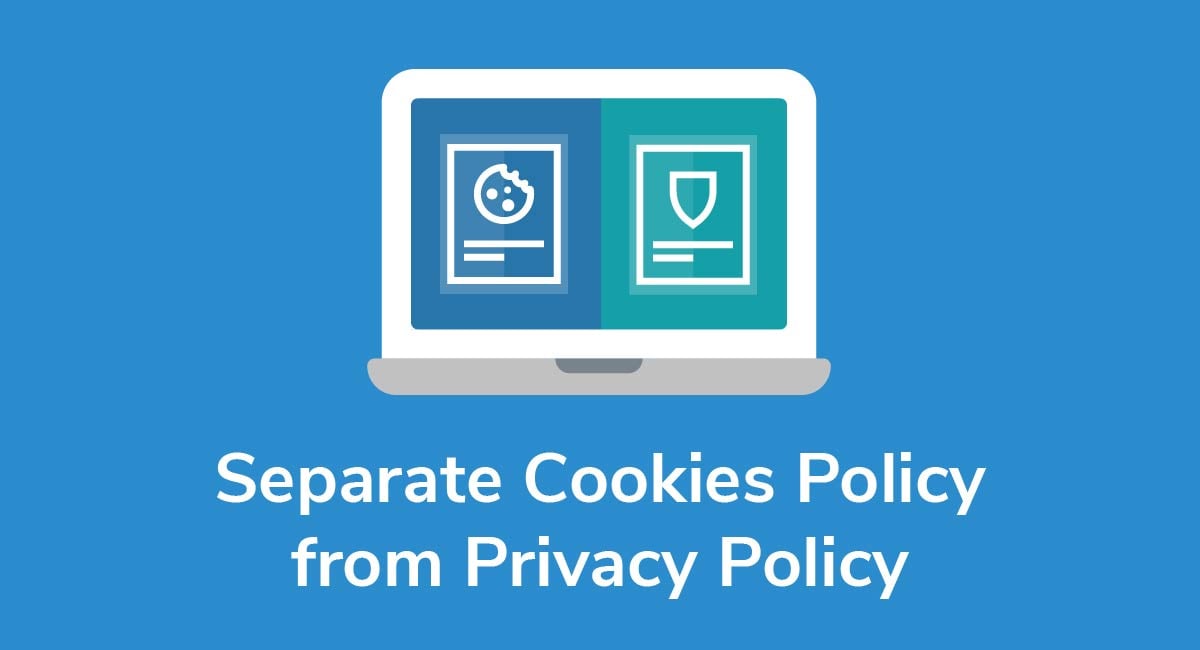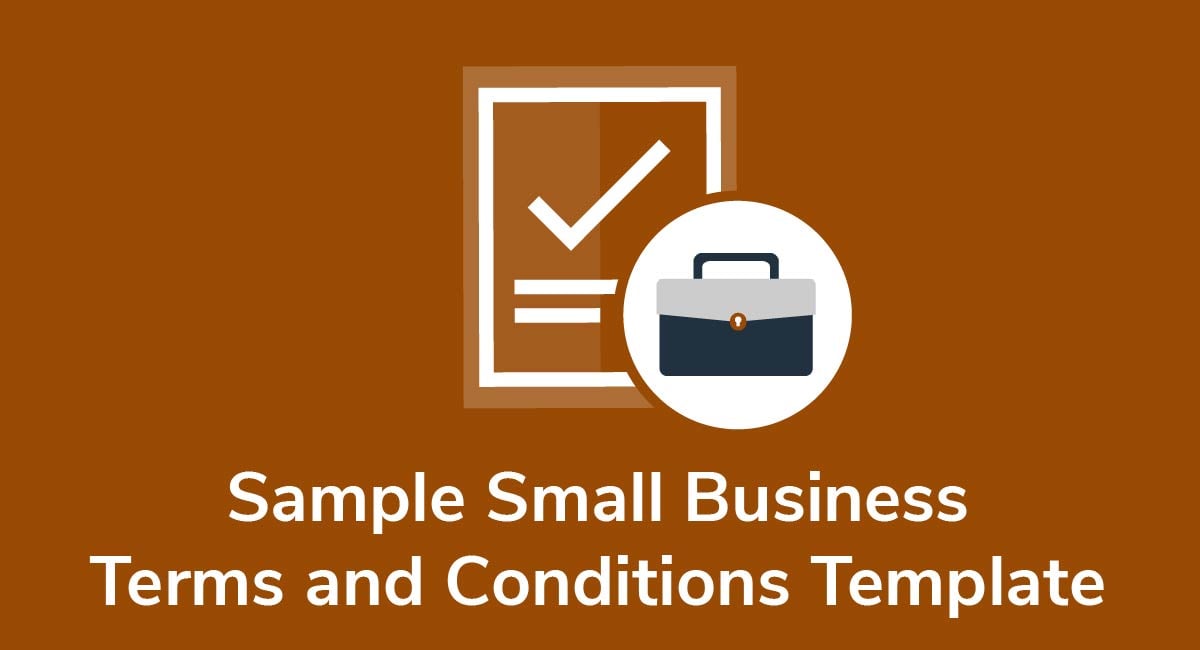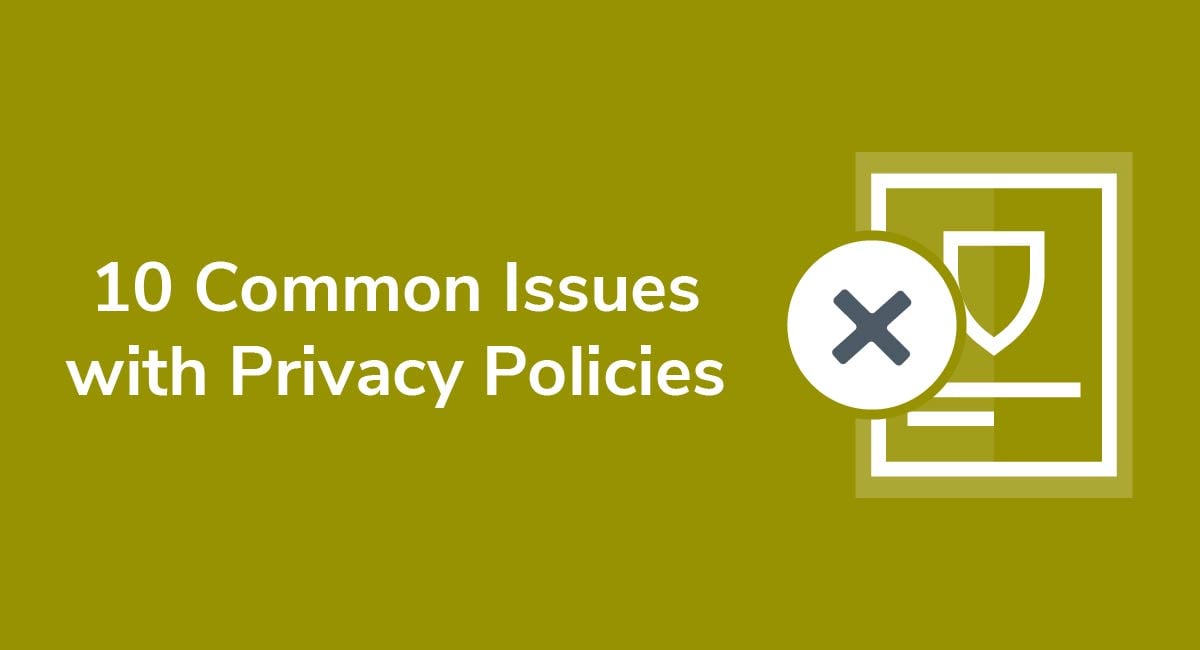Privacy Policies Versus Terms and Conditions Agreements
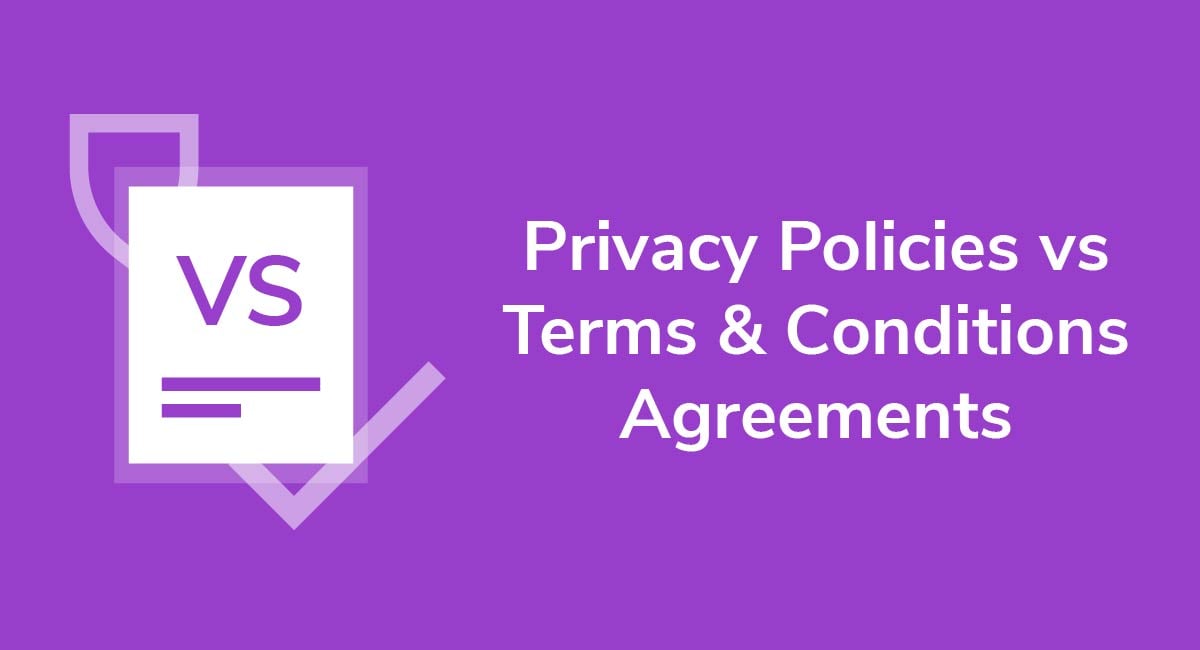
The main difference between a Privacy Policy and Terms and Conditions (T&C) agreement is that a Privacy Policy exists to protect your clients, while a T&C agreement exists to protect you, the company.
But there's a lot more to it than just that. Let's take an in-depth look at each agreement and what they accomplish for you and your customers.
Why You Need a Privacy Policy

Privacy Policies are required by law if you collect or use personally identifying and/or private information.
This requirement has come from regulations like the European Union's GDPR and California's CalOPPA that aim to protect personal information.
Privacy regulations have been created by governmental bodies, like the aforementioned California and EU, to protect their citizens' privacy. There is not yet any way and nor is it profitable to simply say, "Fine, so I just won't sell to people in those places."
You'll have to have a Privacy Policy in place in order to protect customers from regulation-protected countries because you just can't stop these people from using your product - nor should you want to if you wish to succeed in business.
A Privacy Policy is not only required by governing bodies. Third parties like advertising and analytics platforms (like AdMob or Flurry) will require you to have a suitable Privacy Policy in place and conspicuously posted before they'll allow you to integrate their services into your app.
But there's another reason why a Privacy Policy is a good thing to have: It's good for business.
Here are just a few reasons why:
-
A carefully drafted, easy to understand, and maybe even entertaining Privacy Policy inspires trust in clients, encouraging them to sign up with you and stick around for awhile. It makes users feel safe and cared for, and this inspires faith in your product.
The Spruce Eats starts out its Privacy Policy by assuring users that the company values and respects privacy concerns:
-
A Privacy Policy teaches (or reminds) people that they have rights worth protecting.
This may not seem like such a big thing, but in a world where people assume it's okay to pirate information and sell it to the highest bidder, everyone loses, including you. People need to know and be reminded of their rights.
A simple clause like the following from Elsevier's Privacy Policy is not only informative. It's educational as well:
-
A Privacy Policy clearly lays out where your boundaries are when it comes to the data you use and how you plan to use it.
This will come in handy if one of your users one day decides that you had no right to show them third party advertisements based on information gathered from their account. With a good Privacy Policy agreement you can show that you gave them every opportunity to know what they were getting into, and that they were free to decline to use your app as well as to change or remove their information.
-
A good Privacy Policy will protect you from fines and other penalties.
The time has come when you not only must be honest and clear about your privacy practices to potential users, but you must also be transparent to government authorities. These authorities can demand that companies be ready to show them not only a solid Privacy Policy that's prominently posted to the world, but also require that the company to show that they have strong security measures in place to protect client information from hackers.
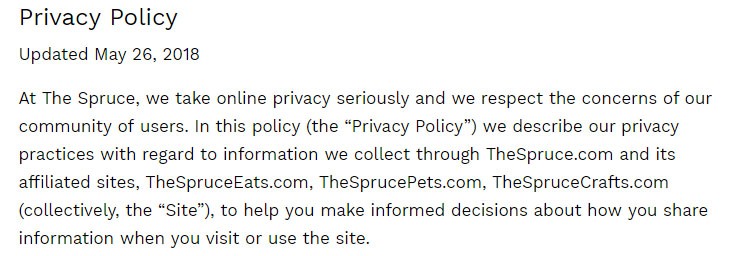

Drafting Your Privacy Policy

When creating a Privacy Policy for your business, it helps to understand and consider the spirit of the law and not just the letter.
Need a Privacy Policy? Our Privacy Policy Generator will help you create a custom policy that you can use on your website and mobile app. Just follow these few easy steps:
- Click on "Start creating your Privacy Policy" on our website.
- Select the platforms where your Privacy Policy will be used and go to the next step.
- Add information about your business: your website and/or app.
- Select the country:
- Answer the questions from our wizard relating to what type of information you collect from your users.
-
Enter your email address where you'd like your Privacy Policy sent and click "Generate".

And you're done! Now you can copy or link to your hosted Privacy Policy.




Your Privacy Policy exists first and foremost to protect client confidentiality, so do all you can to ensure just that.
Keep it separate from any other legal agreements you may have. Make sure it has its own section and is referenced as such.
Be accurate (and current) regarding what information you collect, why you collect it, what you're using it for, and with which third parties you'll be sharing it. Never collect more than what you say you'll collect and never ever give it to anyone besides those your Privacy Policy clearly states you'll be sharing with.
Make sure to include the word "Privacy" in the agreement's title and in any references or links to it.
If your product is a software app, make sure a link to the agreement is posted on your app's dashboard, on your app's website, and in any online marketplace where the app is distributed.
Make sure that users know how to make changes, if necessary, to any of the information they provide and that they understand that they can withdraw their information (and how to do so).
Make your Privacy Policy understandable.
According to Giovanni Buttarelli, supervisor of the European data-protection authority, "We need to first focus on compliance, and therefore what is more important is that people receive shorter, more communicative notices based on very simple and concise language, and where you do not need to make use of artificial intelligence" [to interpret it].
The Importance of Terms & Conditions Agreements

A T&C agreement (also sometimes called "Terms of Service" or "Terms of Use") tells the customer what will be legally required of them if they subscribe to your service or download and use your mobile app.
Simply put, a T&C agreement gives you a legal leg to stand on in the event of abuse or litigation. While not required by law like a Privacy Policy is, a T&C is incredibly useful to businesses.
A T&C agreement might include the following:
- A disclaimer regarding the company's liability, such as this from The Spruce Eats:
- Usage restrictions and prohibited activities while using the site
- What the company is prepared to do in cases of abuse of the platform, such as terminating an account
- Copyright and intellectual property information
- Warranty disclaimers
- Terms for billing
- Subscription agreements

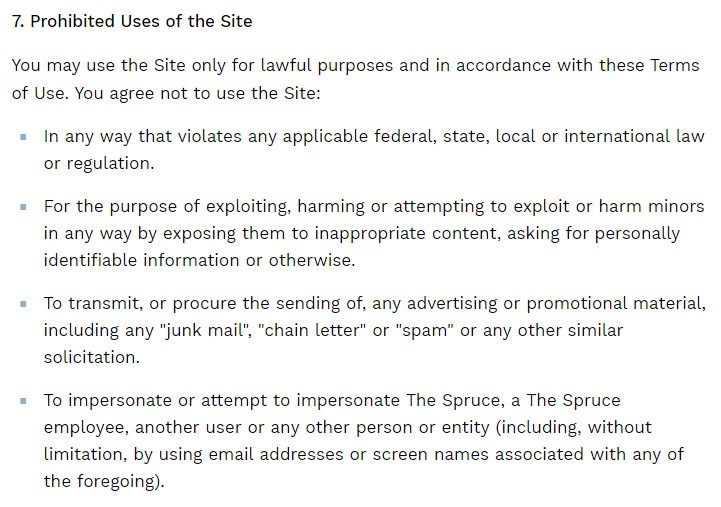
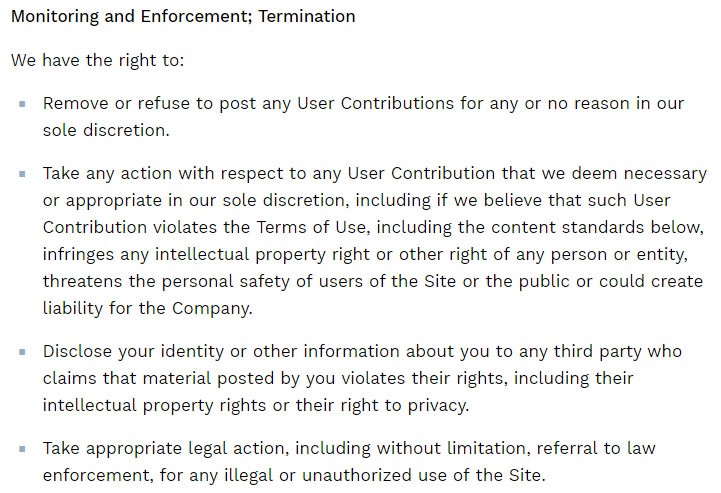

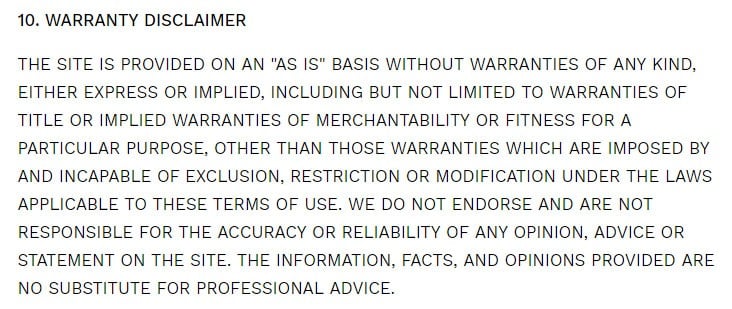
Your T&C agreement can also reference your Privacy Policy or include a link to it, but it's important to keep the Privacy Policy and the T&C separate as legal agreements.
Drafting Your Terms and Conditions Agreement

Just as a Privacy Policy established the frontiers of information collection and use, the T&C agreement explains to potential users what will and will not be tolerated by the business and what will be done if the client breaches these rules.
Need Terms and Conditions for your business? We can help you generate a customized Terms and Conditions agreement in around two-three minutes for free. Try our Terms and Conditions Generator and just follow these steps:
- Click on the "Create your Terms and Conditions today" button.
- At Step 1, select the where will you use your Terms & Conditions and click "Next step":
- Add information about your business:
- Select the country and continue to the "Next step":
- Answer the questions about your business practices and click "Next step" when finished:
-
Enter your email address where you'd like your agreement sent and click "Generate."

You're done! Now you'll be able to instantly access and download your new agreement.
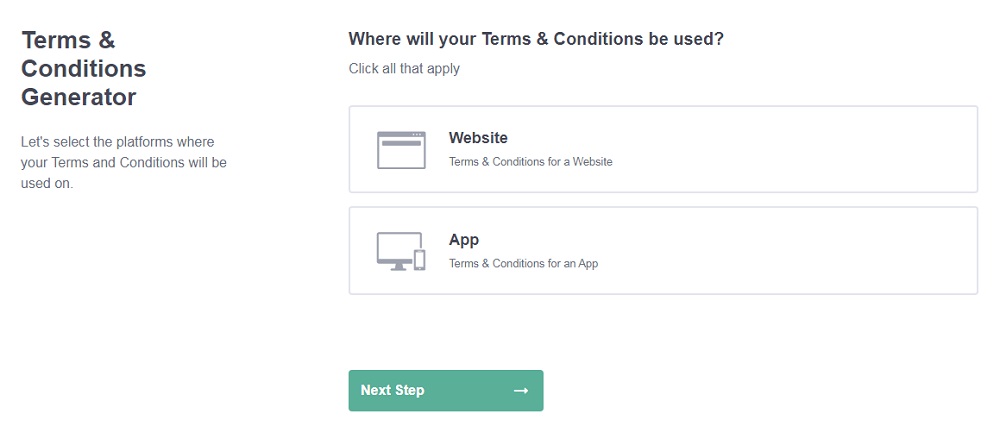
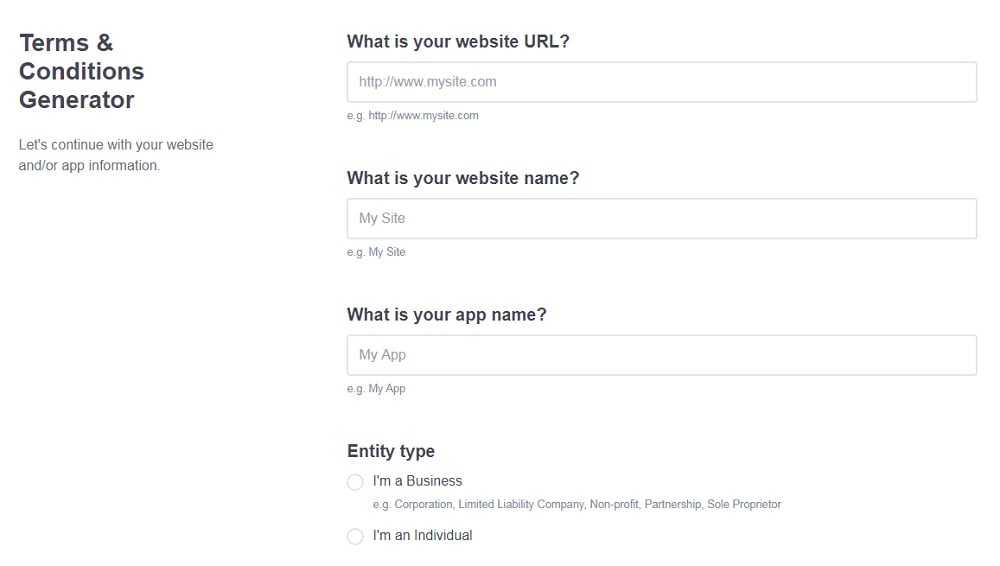
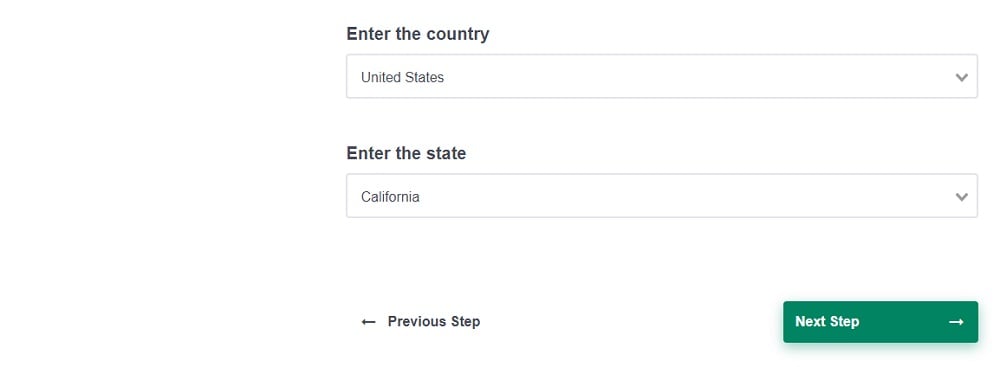
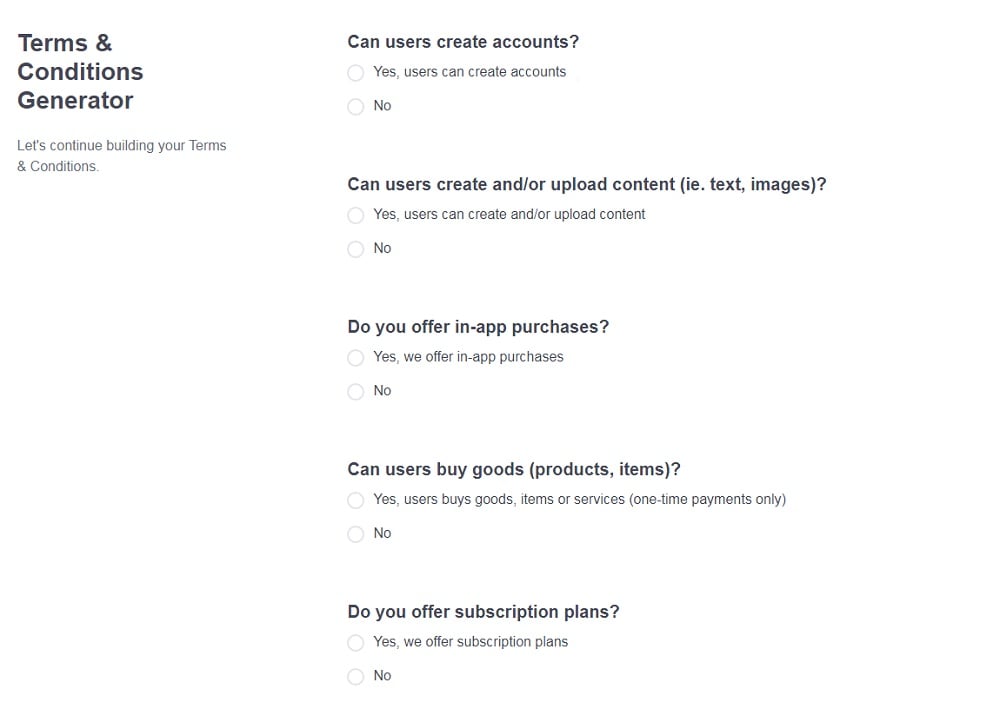
Some things to keep in mind:
- This agreement is the perfect receptacle for all the information you need to share with users regarding copyright, licensing rights, rules of use, and limits of liability.
- This is also the place to spell out what users can expect to happen if they abuse the platform (e.g. their accounts being terminated)
Since there aren't any laws regulating the way T&C agreements need to be written or presented, you should follow best practices.
Write your T&C agreement to be clear, easy to follow and very informative.
Privacy Policies
- Inform the user about what personally identifying information you'll be collecting.
- Explain why you're collecting this information.
- Explain what you're going to do with it, including with which third parties you may be sharing it.
- Tell the users which security measures are in place to ensure the security of their information.
- Tell the users how then can see and change their information in their account with you.
Terms and Conditions Agreements
- How your product is allowed to be used
- Warranty disclaimers
- Billing information
- Under what circumstances a user's account might be terminated
- Copyright information
- Requirements for user-generated content
